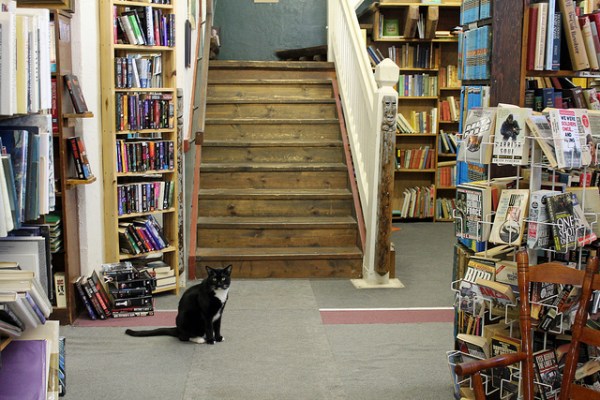Amazon has not been seen as a fast friend of the brick-and-mortar bookstore business. The rise of discounted books sold online often undercuts what traditional retailers have been able to offer, leading to the death of those local businesses — a trend that has been accentuated with the rise of e-books that do away with the idea of anything paper-based altogether. Now, somewhat improbably, Amazon is launching Amazon Source, a new program where it hopes to work with independent booksellers to sell Kindle e-readers and Kindle Fire tablets.
Amazon Source builds on a groundbreaking deal that Amazon cut with Waterstones in the UK in 2012. That deal saw the latter company jump into bed with Amazon to resell Kindle devices in its stores, after months of speculation that Waterstones would team up with Barnes & Noble instead to resell its Nook devices, with the head of the UK bookseller publicly slamming Amazon in the lead-up to the deal. Because of all this, at the time, Amazon’s deal with Waterstones was seen as an aggressive, typically Amazonian, coup.
While we have seen various moves to counterbalance the effect that Amazon has had on independent booksellers (the French government being a big force here) some beg to differ about claims that independent bookstores have been impacted by the rise if Amazon — specifically, it’s the biggies that have been hardest hit, the argument goes. Indeed, a lot of indie bookstores have made the move even to selling directly on Amazon as part of its marketplace.
With Amazon Source, Amazon is building on the latter argument and business model, with the idea being that independent bookstores have customers who want to buy e-books as much as they want to buy physical copies, and this gives those shops a route to offering the most popular device in this category.
“We believe that retailers, online or offline, small or large, should be striving to offer customers what they want—and many customers want to read both digital and print books,” said Russ Grandinetti, Vice President, Amazon Kindle, in a statement. “For many years, bookstores have successfully sold print books on Amazon — now Amazon Source extends this opportunity to digital. With Amazon Source, customers don’t have to choose between e-books and their favorite neighborhood bookstore—they can have both.”
The program will see Amazon offering bookstores the chance to sell Kindles (which they buy wholesale at between 6% and 9% discount from the Manufacturer Suggested Retail Price, Amazon says), and to share in some of the benefits of doing so — for a limited time, at least. For every Kindle book that a user buys after purchasing the e-reader or tablet, the bookseller gets a 10% cut for the first two years of ownership.
Booksellers also get a discount on buying Kindle accessories wholesale (at a 35% discount from the Manufacturer Suggested Retail Price). Amazon says the discounts on Kindles can be bigger if booksellers choose to forego the 10% cut on e-book sales. And there is an insurance policy of sorts: after the first order from Amazon Source, the company says, “if a retailer decides they no longer want to sell Kindle, Amazon will buy back the inventory for up to six months after their first order, with no questions asked.”
As someone who lives in London and is a regular visitor to Waterstones, it’s interesting to see the Kindle displays in the stores. They always have people converged around them, often children who have been dragged into the shops by their parents.
Waterstones also has made a point of offering other devices as well to give users a full choice. “We are committed to offering the best possible book buying experience. It is a truly exciting prospect to harness the respective strengths of Waterstones and Amazon to provide a dramatically better digital reading experience for our customers,” notes James Daunt, MD of Waterstones, in a statement. “Alongside Amazon, we have married the best digital readers, the Kindle family, to the singular pleasures of browsing a curated bookshop. With the combination of our talents we are on our way to offering the exceptional customer proposition to which we both aspire.”
In Waterstones’ flagship store in the city, it puts the Kindle stand very close to check-out, meaning that users will may only visit it after they’ve done their browsing for physical devices. Smaller bookstores may not have the luxury of creating layouts that lead users in such a way.
It will be interesting to see whether other booksellers take the plunge to offer a similar kind of choice to users. Maybe it’s common sense and inevitable for physical booksellers to make sure they offer their customers as much choice as they can, and maybe there really are people who are walking into these shops looking for e-books and e-book readers rather than printed volumes. Still, I can’t help but think that this is a little like punching a guy after you’ve already knocked him down, and the guy (if bookstores say yes) more or less saying, please, punch me more!
Image: Flickr
